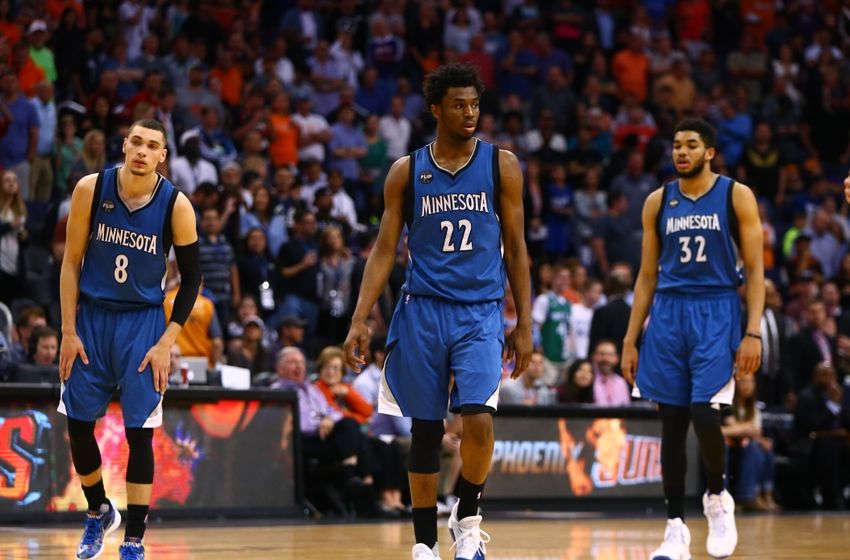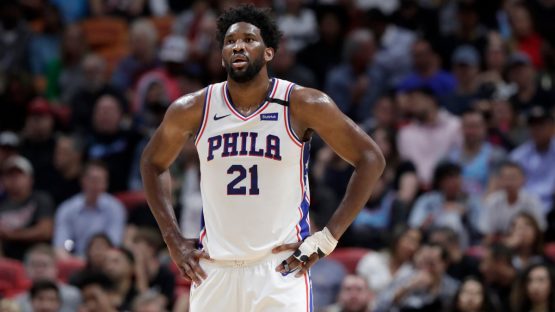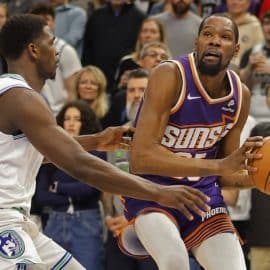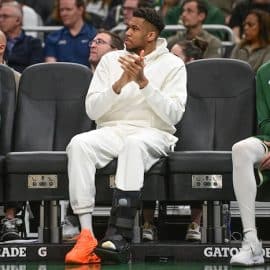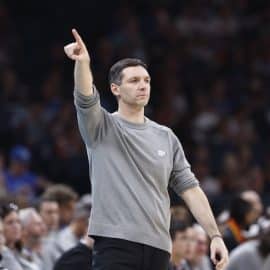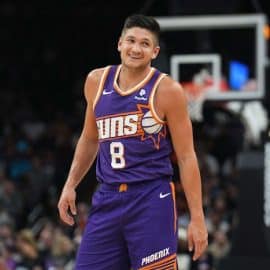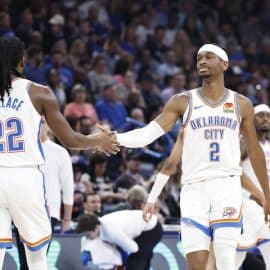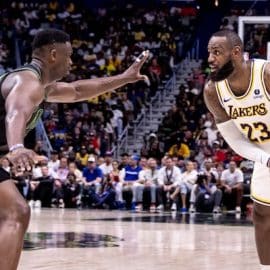Preseason expectations were sky-high for the Minnesota Timberwolves, but the first quarter of the season has been a massive disappointment. Why haven’t the young Wolves reached their potential?
Even the most remarkable of things can crumble under the weight of expectations. A beautiful vista falls short when compared to the Grand Canyon. A well-shot film is mediocre when it falls just short of its perfect review. A fully competent leader becomes a failure alongside Abraham Lincoln or Winston Churchill.
When we expect an unreasonable goal, any progress fades into the weight of disappointment. No team knows this better than the Minnesota Timberwolves.
Late-season victories over the Golden State Warriors and [insert team] added tangible success to unbridled potential. With three budding stars all under the legal drinking age, the youngest team in the league was poised to take a huge leap.
Then they hired the most accomplished coach on the market, Tom Thibodeau, and suddenly the Minnesota Timberwolves were on everyone’s list of breakout teams. “Thibs” would instill his elite defensive scheme into the young group, and with a surefire top-15 defense they would vault into the playoff picture.
Nearly every prominent media member predicted a .500 season for the Wolves, with many sticking them in the playoffs as the seventh or eighth seed. Tim Bontemps of the Washington Post called for a 50-win season, and ESPN’s resident LeBron James expert, Brian Windhorst, spent the preseason not in Cleveland, but covering the Timberwolves. Everyone waited for the season to tip off and Minnesota to show its progress.
The Timberwolves are currently 7-18, 14th in the Western Conference and currently slotted for the third pick in next year’s draft. Despite Thibs’ influence their hard start has the Timberwolves sitting at 27th in the league in defensive efficiency, closer to the Lakers in 30th than the Nuggets in 26th.
Why aren’t the Timberwolves taking off the way they were supposed to?
https://www.youtube.com/watch?v=UYKTvxd4auM
Other articles will take a more nuanced approach to this question, and rightfully so. An early injury to Ricky Rubio, Thibodeau’s insistence to start two bigs, bad luck in close games, and a lack of impact by offseason additions are all facets of their early-season faceplant.
But ultimately those types of explanations are unpacking the question of why the Timberwolves are 7-18 and not, say, 10-15. That is because the Minnesota Timberwolves have suffered the most from the expectations placed on their shoulders. The Timberwolves should not have been pegged as a playoff team in preseason for one simple reason: they are incredibly young.
The Timberwolves are the youngest team in the league, both by overall age and weighted for minutes played. The only players in their regular rotation not playing on their rookie contracts are Ricky Rubio and Cole Aldrich. Brandon Rush received run in the absence of Rubio early in the season, but he has received only spot or garbage time minutes; Jordan Hill is behind Adreian Payne in the rotation.
Karl-Anthony Towns celebrated his 21st birthday just weeks ago, and Andrew Wiggins and Zach LaVine are likewise just 21. Kris Dunn has struggled to make an impact as a rookie, and the team’s third point guard – Tyus Jones – is merely 20 himself and a second-year player. Even the elder statesman of the core, Ricky Rubio, celebrated his 26th birthday days before the start of the season. This team is, in basketball years, still wearing onesies.
That’s the problem with expecting this team to immediately make such a defensive leap in their first year under Thibodeau. Yes, the defensive potential is there; Towns looks like a rim-protector of the future, able to switch out to the perimeter and recover to swat opposing shots away. Andrew Wiggins has the body of an elite wing defender, Rubio already is an elite defender, and Kris Dunn has the tools to follow in Rubio’s footsteps.
But when Thibodeau arrived in Chicago, he wasn’t dealing with the same sort of roster. While he did vault the team into the top-10 in defense immediately – a perch they kept throughout his tenure until the final year – that was on the back of defensive-minded veterans like Joakim Noah and Luol Deng. He also had reserves such as Taj Gibson and Omer Asik in the mix, giving him a sea of rim protection in the big rotation.
Outside of Rubio, those veteran defenders are not on this Timberwolves roster. There is no Kevin Garnett to set the tone defensively, no Joakim Noah to bark out directions from the backline. Karl-Anthony Towns is still learning how to play NBA defense; he isn’t ready to direct traffic yet.
Thibodeau has to spend this season teaching the team basic defensive principles. They cannot move on a string until they know where to move; they cannot funnel opposing ball-handlers towards help until they know the help will be there. Icing the pick-and-roll, stunting off of shooters, showing and slipping and switching on screens – these are techniques the Timberwolves can execute in due time, but not until they have the fundamentals in place.
Thibodeau needs time to get his freshman class up to speed, and it isn’t fair to him or the team to expect instant progress. He’s teaching an advanced defensive scheme to 21 year-olds, not making Ramen in the microwave.
On offense the Timberwolves have seen more success, currently ranking 10th in offensive efficiency. Wiggins has cooled off after a volcanic start and settled into the role of a solid scorer, Towns is still learning how to use his elite combination of athleticism and skill (and putting up stellar numbers in the process), and LaVine is pouring in points from outside. The only teams in the league with three 20 point scorers? The Golden State Warriors, the Cleveland Cavaliers, and the Minnesota Timberwolves.
The potential of this group to reach stratospheric heights was part of the preseason hype, but realistically this group needs time to learn how to fly. Comparisons were drawn this offseason between the Young Wolves and the Oklahoma City Thunder, when the latter team leapt from 23 to 50 wins in a competitive Western Conference.
It seems like an attractive comparison to make, and a flattering one to Minnesota. The Thunder rode that momentum into an annual seat at the contender’s table. But it’s unfair to the Timberwolves, for a number of reasons.
That Thunder team had Kevin Durant, Russell Westbrook, and James Harden. Currently those three players are on separate teams and are arguably the three frontrunners for MVP. As great as this young Timberwolves core is, they are not going to produce three MVP candidates. They also don’t have a stable of veterans such as Nick Collison and Kevin Ollie.
The Minnesota Timberwolves are still brimming with potential and talent, and this core competing for a title in the next five years seems a fait accompli. But expecting the team to hit those heights this season is unfair to the team and fans alike, and it diminishes what they have accomplished this season.
Because the youngest team in the league has accomplished a lot, from fielding a top-10 offense to putting together some of the league’s best highlight plays. Andrew Wiggins has added the long-range shot everyone agreed he needed to add, Zach LaVine is sustaining his elite scoring from last year (and improving on it), and Karl-Anthony Towns is putting together a robust stat line worthy of All-Star consideration.
Playoffs? That’s not coming this season. But that doesn’t mean this team isn’t worth watching this year as they grow together and build towards something greater in the future.
If we expect the Grand Canyon every time the Timberwolves take the court, they are only going to sow disappointment. But if we understand the beauty of the landscape unfolding in Minneapolis, we can enjoy this team now and when they reach the historic heights they are destined for.
Add The Sports Daily to your Google News Feed!
